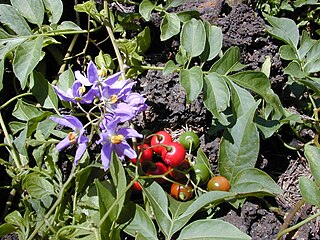
Eggplant (US), aubergine (UK), or brinjal is a plant species in the nightshade family Solanaceae, Solanum melongena, grown for its often purple edible fruit.
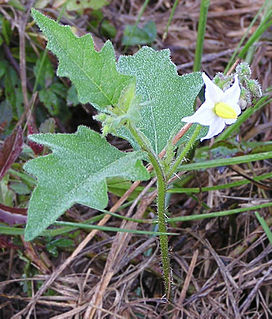
Solanum carolinense, the Carolina horsenettle, is not a true nettle, but a member of the Solanaceae, or nightshade family. It is a perennial herbaceous plant, native to the southeastern United States that has spread widely throughout much of temperate North America. It has also been found in parts of Europe, Asia, and Australia. The stem and undersides of larger leaf veins are covered with spines.

Solanum dulcamara, also known as bittersweet, bittersweet nightshade, bitter nightshade, blue bindweed, Amara Dulcis, climbing nightshade, fellenwort, felonwood, poisonberry, poisonflower, scarlet berry, snakeberry, trailing bittersweet, trailing nightshade, violet bloom, or woody nightshade, is a species of vine in the potato genus Solanum, family Solanaceae. It is native to Europe and Asia, and widely naturalised elsewhere, including North America, where it is an invasive problem weed.

Solanum mauritianum is a small tree or shrub native to South America, including Northern Argentina, Southern Brazil, Paraguay and Uruguay. It has become a widespread invasive weed in Azores Islands, Cook Islands, Fiji, Hawai‘i, New Caledonia, Norfolk Island, Solomon Islands, Tonga, Réunion Island, Mauritius, Madagascar, Australia, New Zealand, India, Sri Lanka and several southern African countries. Its common names include earleaf nightshade, woolly nightshade, flannel weed, bugweed, tobacco weed, tobacco bush, wild tobacco and kerosene plant.

Solanum pseudocapsicum is a nightshade species with mildly poisonous fruit. It is commonly known as the Jerusalem cherry, Madeira winter cherry, or, ambiguously, "winter cherry". These perennials can be grown decoratively as house plants, but in some areas of South Africa, Australia and New Zealand it is regarded as a weed.
Solanum aculeastrum is commonly known as soda apple, sodaapple nightshade, goat apple, poison apple, or more ambiguously as "bitter-apple". It is a poisonous nightshade species from Africa and not related to true apples. The term "soda apple" probably derives from "Sodom apple", modified due to the fruit's detergent properties.

Solanum nigrum is a species in the genus Solanum, native to Eurasia and introduced in the Americas, Australasia, and South Africa. It is also known as black nightshade. Parts of this plant can be toxic to livestock and humans. Nonetheless, ripe berries and cooked leaves of edible strains are used as food in some locales, and plant parts are used as a traditional medicine. A tendency exists in literature to incorrectly refer to many of the other "black nightshade" species as "Solanum nigrum".
A Group is a formal category in the International Code of Nomenclature for Cultivated Plants (ICNCP) used for cultivated plants (cultivars) that share a defined characteristic. It is represented in a botanical name by the symbol Group or Gp. "Group" or "Gp" is always written with a capital G in a botanical name, or epithet. The Group is not italicized in a plant's name. The ICNCP introduced the term and symbol "Group" in 2004, as a replacement for the lengthy and hyphenated "cultivar-group", which had previously been the category's name since 1969. For the old name "cultivar-group", the non-standard abbreviation cv. group or cv. Group is also sometimes encountered. There is a slight difference in meaning, since a cultivar-group was defined to comprise cultivars, whereas a Group may include individual plants.

Solanum mammosum is commonly known as nipplefruit, fox head, cow's udder, or apple of Sodom, is an inedible Pan-American tropical fruit. The plant is grown for ornamental purposes, in part because of the distal end of the fruit's resemblance to a human breast, while the proximal end looks like a cow's udder. It is an annual in the family Solanaceae, and part of the genus Solanum, making the plant a relative of the eggplant, tomato, and potato. This poisonous fruit is native to South America, but has been naturalized in Southern Mexico, Greater Antilles, Central America, and the Caribbean. The plant adapts well to most soils, but thrives in moist, loamy soil.

Solanum nelsonii, common names pōpolo and Nelson's horsenettle, is a partially woody sprawling shrub-like perennial plant in the Solanaceae family, part of the Solanum or nightshade genus. This poisonous plant is endemic to the Pacific Islands. It grows low in coastal sites in coral rubble to pure sand.
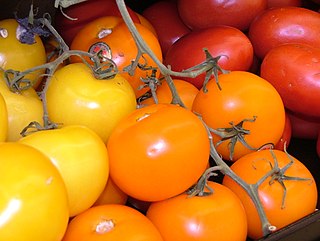
Lycopersicon was a genus in the flowering plant family Solanaceae. It contained about 13 species in the tomato group of nightshades. First removed from the genus Solanum by Philip Miller in 1754, its removal leaves the latter genus paraphyletic, so modern botanists generally accept the names in Solanum. The name Lycopersicon is still used by gardeners, farmers, and seed companies. Collectively, the species in this group apart from the common cultivated plant are called wild tomatoes.
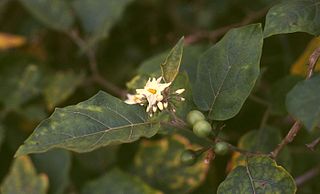
Solanum torvum is a bushy, erect and spiny perennial plant used horticulturally as a rootstock for eggplant. Grafted plants are very vigorous and tolerate diseases affecting the root system, thus allowing the crop to continue for a second year.

Solanum elaeagnifolium, the silverleaf nightshade or silver-leaved nightshade, is a common weed of western North America and also found in South America. Other common names include prairie berry, silverleaf nettle, white horsenettle or silver nightshade. In South Africa it is known as silver-leaf bitter-apple or satansbos. More ambiguous names include "bull-nettle", "horsenettle" and the Spanish "trompillo". The plant is also endemic to the Middle East.
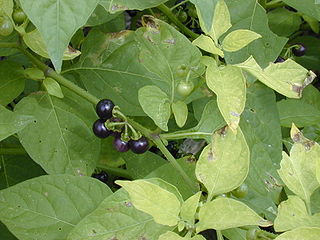
Black nightshade is a common name for several plants and may refer to:

Lycianthes is a genus of plants from the nightshade family (Solanaceae), found in both the Old World and the New World, but predominantly in the latter. It contains roughly 150 species, mostly from tropical America, with 35-40 species in Asia and the Pacific.
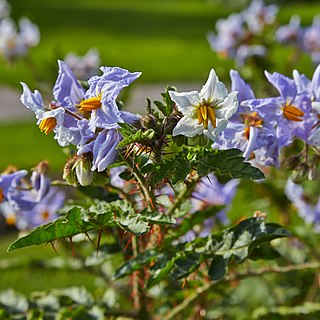
Solanum sisymbriifolium is commonly known as vila-vila, sticky nightshade, red buffalo-bur, the fire-and-ice plant, litchi tomato, or Morelle de Balbis.

Solanum bahamense, commonly known as the Bahama nightshade, is a plant in the nightshade family. It is native across the West Indies, from the Florida Keys east to Dominica. It is a common species in coastal habitats, often on calcareous soils.
Solanum lanceolatum, with the common names orangeberry nightshade and lanceleaf nightshade, is a species of nightshade. It is native to regions of South America, including the Cerrado ecoregion of the Tropical and subtropical grasslands, savannas, and shrublands biome, primarily in Brazil.

Solanoideae is a subfamily of the flowering plant family Solanaceae, and is sister to the subfamily Nicotianoideae. Within Solanaceae, Solanoideae contains some of the most economically important genera and species, such as the tomato, potato, eggplant or aubergine, chili and bell peppers, mandrakes, and jimson weed.

